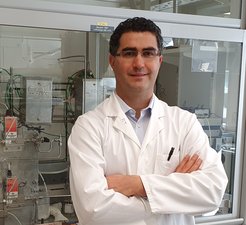Harun Tüysüz from the MPI für Kohlenforschung receives DECHEMA Prize 2019 for his work on the development of heterogeneous catalysts
The award is granted for his outstanding work on the development of catalysts that can be used both for chemical syntheses and for energy conversion.

PD Dr. Harun Tüysüz who is leading the group of Heterogeneous Catalysis and Sustainable Energy at the Max-Planck-Institut für Kohlenforschung is awarded with the DECHEMA Prize 2019 for his outstanding research on the development of catalysts that can be used both for chemical syntheses and energy conversion. The Gesellschaft für Chemische Technik und Biotechnologie (DECHEMA) awards the prize, which is endowed with 20,000 euros, annually to excellent researchers who are engaged in technical chemistry, process engineering, biotechnology or reactor engineering. The award ceremony will take place during the DECHEMA Day.
The research focus of PD Dr Harun Tüysüz is design and development of nano- and mesostructured materials for catalytic applications, which are used for sustainable energy related applications.. Catalytic model reactions include water splitting and the conversion of CO and CO2, which are also industry relevant. As a member of the Carbon2Chem consortium, for example, Harun Tüysüz is working with industrial partners and other research institutes with the aim to convert steel mill waste gases into valuable chemicals by using renewable energies.
Another important research topic of Harun Tüysüz is the electrolysis of water, i.e. splitting of water into clean hydrogen and oxygen. His team is developing new materials and electrodes in order to make oxygen production more efficient. He has developed processes such as using tea and coffee wastes as a template for the industrial production of nanoparticles, in which the waste is recycled and used as an important starting material for new applications. The electrolysis of water is considered a key technology for future energy landscape and sustainable chemistry that does not require fossil as raw material.
About Harun Tüysüz
Harun Tüysüz studied chemistry at the University of Akdeniz. After completing his master's thesis at the Gebze Technology Institute in 2004, he received his doctorate at the Max-Planck-Institut für Kohlenforschung in Mülheim in 2008. This was followed by a postdoctoral stay at the University of California Berkeley in the United States. In 2012 Tüysüz returned to the Max-Planck-Institut für Kohlenforschung and became leader of the group of Heterogeneous Catalysis and Sustainable Energy. In 2016, Harun Tüysüz habilitated at the Ruhr University of Bochum and was awarded the Jochen-Block-Prize of the German Catalysis Society (GeCatS) for his work in catalysis research in the same year. In 2019 he received a large research grant from the Volkswagen Foundation for his participation in the "Origin of Life" project, which investigates the earliest biochemical processes that are believed to have led to the creation of life.












